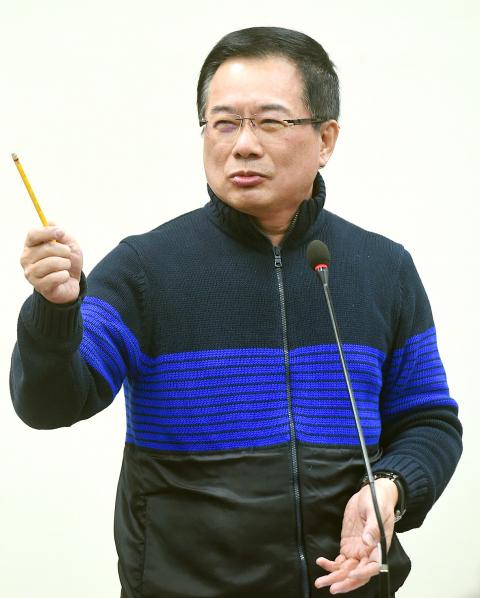A spat between Chinese Nationalist Party (KMT) Central Policy Committee director Alex Tsai (蔡正元) and former president Ma Ying-jeou’s (馬英九) office entered day three yesterday after Tsai criticized Ma for comments about the 228 Incident.
Responding to calls to punish those responsible for the deaths of tens of thousands of people during the White Terror era following the 228 Incident, Ma on Monday said at an event marking the 70th anniversary of the Incident that because Chiang Kai-shek (蔣介石) was president at the time, he “should naturally be held accountable.”
The extent of Chiang’s responsibility was up to people to determine for themselves by studying public information, Ma said.

Photo: Liao Chen-huei, Taipei Times
Tsai on Monday said that Ma is not in a position to assign responsibility for the 228 Incident, because he enjoyed “eight years of wealth and rank.”
“Ma’s small disciples” should be reminded that then-governor-general Chen Yi (陳儀), who ordered police and military action against protesters during the 288 Incident, was less corrupt than Ma, Tsai said, without saying who the “disciples” were.
Ma office spokeswoman Hsu Chiao-hsin (徐巧芯) on Thursday said Tsai was not as righteous as his comments made him appear to be, citing a ruling that found Tsai had taken shares from Central Motion Picture Corp and registered them in his own name.
Tsai lost an appeal to overturn the ruling and in May last year was ordered to pay the corporation NT$170 million (US$5.48 million).
“If you want to talk about who is most harmful to the KMT, nobody can compete with Alex Tsai,” Hsu said.
She said Tsai was harming camaraderie among party members by making unsubstantiated attacks on former party chairpersons.
“Could it be that party headquarters is going to let its officials continue to run amok?” Hsu asked, adding that if KMT Chairwoman Hung Hsiu-chu (洪秀柱) continues to indulge Tsai, it would be detrimental to the party caucus and negatively affect preparations for the May 20 party chairperson election.
Tsai said he is open to discuss his dealings with Central Motion Picture.
“However, you [Hsu] have to remember that at the end of the war, the one who would be most injured would not be Alex Tsai, but ‘he who is the greatest’ in your heart,” Tsai said, an apparent reference to Ma.
Tsai said that he was going to write a memoir about the Central Motion Picture case when he was much older, as well as a story about Somali pirates, “because both incidents involve ‘the greatest,’ but if you [Hsu] want to extend the war to infinity, I am ready,” Tsai said.

The manufacture of the remaining 28 M1A2T Abrams tanks Taiwan purchased from the US has recently been completed, and they are expected to be delivered within the next one to two months, a source said yesterday. The Ministry of National Defense is arranging cargo ships to transport the tanks to Taiwan as soon as possible, said the source, who is familiar with the matter. The estimated arrival time ranges from late this month to early next month, the source said. The 28 Abrams tanks make up the third and final batch of a total of 108 tanks, valued at about NT$40.5 billion

Two Taiwanese prosecutors were questioned by Chinese security personnel at their hotel during a trip to China’s Henan Province this month, the Mainland Affairs Council (MAC) said yesterday. The officers had personal information on the prosecutors, including “when they were assigned to their posts, their work locations and job titles,” MAC Deputy Minister and spokesman Liang Wen-chieh (梁文傑) said. On top of asking about their agencies and positions, the officers also questioned the prosecutors about the Cross-Strait Joint Crime-Fighting and Judicial Mutual Assistance Agreement, a pact that serves as the framework for Taiwan-China cooperation on combating crime and providing judicial assistance, Liang

A group from the Taiwanese Designers in Australia association yesterday represented Taiwan at the Midsumma Pride March in Melbourne. The march, held in the St. Kilda suburb, is the city’s largest LGBTQIA+ parade and the flagship event of the annual Midsumma Festival. It attracted more than 45,000 spectators who supported the 400 groups and 10,000 marchers that participated this year, the association said. Taiwanese Designers said they organized a team to march for Taiwan this year, joining politicians, government agencies, professionals and community organizations in showing support for LGBTQIA+ people and diverse communities. As the first country in Asia to legalize same-sex

MOTIVES QUESTIONED The PLA considers Xi’s policies toward Taiwan to be driven by personal considerations rather than military assessment, the Epoch Times reports Chinese President Xi Jinping’s (習近平) latest purge of the Chinese People’s Liberation Army (PLA) leadership might have been prompted by the military’s opposition to plans of invading Taiwan, the Epoch Times said. The Chinese military opposes waging war against Taiwan by a large consensus, putting it at odds with Xi’s vision, the Falun Gong-affiliated daily said in a report on Thursday, citing anonymous sources with insight into the PLA’s inner workings. The opposition is not the opinion of a few generals, but a widely shared view among the PLA cadre, the Epoch Times cited them as saying. “Chinese forces know full well that